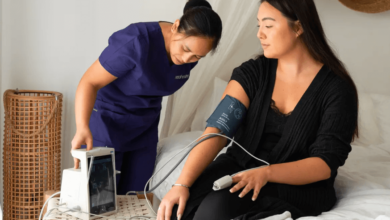The Science of Youth: Choosing the Right Aging Skin Products

As the years go by, our skin begins to tell the story of time—fine lines, wrinkles, uneven texture, and diminished radiance become increasingly noticeable. While aging is a natural process, the beauty and skincare industry has responded with an abundance of solutions tailored to meet the needs of mature skin. Among these, aging skin products have become a crucial part of many people’s daily routines. But not all products are created equal, and understanding their science, ingredients, and effectiveness is key to making the right choices.
Understanding Skin Aging
Before diving into the world of aging skin products, it’s essential to understand what happens to the skin as we age. The aging process is driven by two primary factors:
- Intrinsic Aging: The natural biological process that is genetically programmed and inevitable. It typically starts in the mid-20s and gradually leads to loss of collagen, elastin, and hydration.
- Extrinsic Aging: Caused by external factors like sun exposure, pollution, smoking, poor diet, and stress. It accelerates the aging process and can often be mitigated with the right lifestyle and skincare practices.
As a result of these combined factors, the skin becomes thinner, drier, less elastic, and more prone to sagging and discoloration.
What to Look for in Aging Skin Products
The best aging skin products aim to address the root causes of visible aging while nourishing and protecting the skin. Here are the key ingredients and formulations to look for:
1. Retinoids (Retinol, Retinaldehyde, Retinoic Acid)
Derived from Vitamin A, retinoids are among the most effective anti-aging compounds. They work by accelerating cell turnover and promoting collagen production. Retinoids reduce fine lines, improve texture, and even out pigmentation. However, they can be irritating for sensitive skin, so gradual introduction and proper moisturization are crucial.
2. Peptides
These are short chains of amino acids that signal the skin to produce more collagen and elastin. Peptide-infused aging skin products help firm the skin, reduce wrinkle depth, and promote healing.
3. Hyaluronic Acid
A moisture-binding molecule naturally found in the skin, hyaluronic acid can hold up to 1,000 times its weight in water. It plumps up the skin, reducing the appearance of fine lines and giving a hydrated, youthful look.
4. Vitamin C (Ascorbic Acid)
This potent antioxidant brightens the skin, protects against sun damage, and supports collagen synthesis. Vitamin C is often combined with ferulic acid or Vitamin E for enhanced stability and performance.
5. Niacinamide (Vitamin B3)
This multi-functional ingredient improves skin elasticity, strengthens the skin barrier, reduces redness, and lightens dark spots. It pairs well with many other actives and is generally well-tolerated.
6. Sunscreen (Broad Spectrum SPF 30 or Higher)
No anti-aging routine is complete without sun protection. UV rays are the primary cause of premature skin aging. Daily use of sunscreen prevents further damage and helps maintain the results achieved with other anti-aging products.
See also: The Essential Role of Medical Staffing Agencies in Modern Healthcare
Types of Aging Skin Products
There are several categories of products tailored for aging skin, and each plays a specific role in a comprehensive skincare regimen:
1. Cleansers
Opt for gentle, hydrating cleansers that do not strip the skin’s natural oils. As we age, over-cleansing or using harsh formulas can worsen dryness and irritation.
2. Toners and Essences
Formulated to hydrate and prepare the skin for serums and moisturizers, toners and essences often include antioxidants, peptides, or mild exfoliants.
3. Serums
These are concentrated treatments designed to deliver active ingredients deep into the skin. Serums containing retinol, Vitamin C, or hyaluronic acid are especially popular in aging skin routines.
4. Moisturizers
Choose rich, nourishing creams that restore lipids and lock in moisture. Look for ingredients like ceramides, squalane, and shea butter.
5. Eye Creams
The skin around the eyes is thinner and more delicate. Eye creams containing caffeine, peptides, and hyaluronic acid can reduce puffiness, fine lines, and dark circles.
6. Night Creams and Masks
Overnight treatments help rejuvenate the skin during its repair cycle. Products that include retinoids, peptides, and anti-inflammatory ingredients can maximize the benefits of sleep.
Budget-Friendly vs. High-End Products
While many premium brands offer luxurious formulas, there are also affordable options with clinically proven ingredients. What matters most is the formulation and concentration of actives—not the price tag. Many drugstore brands now include peptides, ceramides, and antioxidants in their aging skin lines.
Realistic Expectations
Aging is a process that can be supported but not reversed. aging skin products are tools to maintain, protect, and enhance the skin’s natural functions. With the right products, users can expect:
- Smoother texture
- Improved hydration
- Reduced fine lines
- Brighter complexion
- Enhanced firmness
However, deeper wrinkles, sagging, and volume loss may eventually require dermatological procedures such as fillers, lasers, or microneedling for significant change.
Conclusion
Navigating the world of aging skin products can be overwhelming, but a thoughtful approach grounded in science and consistency leads to the best results. From powerful antioxidants to hydrating serums, the right combination of products can dramatically improve the look and feel of mature skin.
Remember, aging gracefully doesn’t mean erasing every line—it means taking care of your skin with intention, so it reflects the vitality and confidence you carry from within. Choose wisely, apply consistently, and enjoy the journey of self-care through every stage of life.





